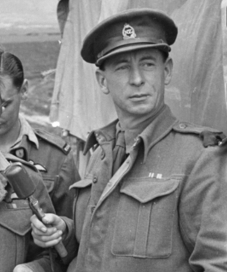
New Zealand Broadcasting Unit commentator Archibald (Arch) Curry leads this broadcast marking the posthumous award of the Victory Cross to Lieutenant Te Moana nui a Kiwa Ngarimu.
Curry was a member of the Mobile Broadcasting Unit which provided the people at home in New Zealand with news about the war. Their broadcasts were varied and included recorded talks during the voyage from New Zealand, concerts and especially personal messages and war updates from members of all ranks of the 2NZEF.
Transcript
The fearless courage of Moana Ngarimu of the Aitanga a Mate people, sub tribe of the Ngati Porou has earned for himself the personal honour of the highest military award and bestowed upon the whole Maori people the distinction of the first Victory Cross to a member of their Battalion. The news is received here by the Maori Battalion, where I speak to you, with profound respect towards the memory of Ngarimu who died in the action on Point 209 in the Tebaga Gap. The whole fighting there called for extreme resolution in one of the bitterest engagements the New Zealanders have experienced. This infantry attack on the height dominating the ‘Hammer’ plains prepared the way for the combined breakthrough of armour and infantry under General Freyberg which broke the Marek position. The Maori Battalion’s part in the initial assault is now especially marked by the singular bravery of this young soldier. Lieutenant Ngarimu fought inGreeceand Crete and there as a Private showed something of the rare qualities of leadership which later inspired his conduct when he was commissioned inAfrica. In one incident of the Greece-Crete campaign his platoon commander and NCOs all became casualties, immediately he assumed command and though wounded three times continued undaunted in the resolute manner which marked the gallant action at Tebaga. This characteristic of purposeful determination was predominant in the superb conduct of Moana Ngarimu quoted in the citation which is one of the finest narratives of action and courage yet recorded. The citation reads:
“Second Lieutenant Ngarimu commanded a platoon in an attack upon the vital hill feature Point 209. He was given a task of attacking and capturing an under-feature forward of Point 209 itself and held in considerable strength by the enemy. He led his men with great dash and determination straight up the face of the hill, undeterred by the intense mortar and machine-gun fire, which was causing considerable casualties. Displaying courage and leadership of the highest order, he was himself first on the hill crest, personally annihilating in the process at least two enemy posts. In the face of such a determined attack the remainder of the enemy fled, but further advance was impossible as the reverse slope was swept by machine-gun fire from Point 209 itself.
Under cover of a most intense mortar barrage the enemy counter-attacked in an attempt to regain their dug-in positions. Second Lieutenant Ngarimu ordered his men to stand to and engage the enemy man for man. This they did with such good effect that the attackers were mown down. Second Lieutenant Ngarimu personally killing several. During this encounter he was twice wounded, once by rifle fire in the shoulder and later by shrapnel in the leg, and though urged by both his company commander and battalion commander to go out of the line, he refused to do so, saying that he should stay a little while with his men. Darkness found this officer and his depleted platoon lying on the rock face of the forward slope of the hill feature, with the enemy in a similar position on the reverse slope about twenty yards distant. Time and again throughout the night the enemy launched fierce attacks in an attempt to dislodge Ngarimu and his men, but each counter-attack was beaten off entirely by this officer’s inspired leadership. During one of these counter-attacks the enemy, by using hand grenades, succeeded in piercing a certain part of the line. Without hesitation Ngarimu rushed to the threatened area, and those of the enemy he did not kill he drove back with stones and with his tommy-gun.
During another determined counter-attack by the enemy, part of his line broke. Calling out orders and encouragement, he went to his dislodged men, rallied them and led them in a fierce onslaught back into their old positions. All through the night, between attacks, he and his men were heavily harassed by machine-gun and mortar fire, but Second Lieutenant Ngarimu watched his line very carefully, cheering his men on and inspiring them by his gallant personal conduct. Morning found him still in possession of the hill feature but only he and two unwounded other ranks remained. Reinforcements were sent up to him. In the morning the enemy again counter-attacked and it was during this attack that Second Lieutenant Ngarimu died. He was killed on his feet defiantly facing the enemy with his tommy-gun at his hip and as he fell he came to rest almost on top of those of the enemy who had fallen to his gun just before he fell to theirs. The hill feature that this officer had so gallantly defended was strewn with enemy dead and was a bold witness of his great courage and fortitude.”
Read the full citation.
Sound file from Ngā Taonga Sound & Vision, ref: 17965. Any re-use of this audio is a breach of copyright.
Image crop from Alexander Turnbull Library.
Bull, George Robert, 1910-1966. Flight Sergeant A G Newman records message to be broadcast in New Zealand from the Italian Front, World War II - Photograph taken by George Bull. New Zealand. Department of Internal Affairs. War History Branch :Photographs relating to World War 1914-1918, World War 1939-1945, occupation of Japan, Korean War, and Malayan Emergency. Ref: DA-05602-F. Alexander Turnbull Library, Wellington, New Zealand.
See full image here

Comments (0)